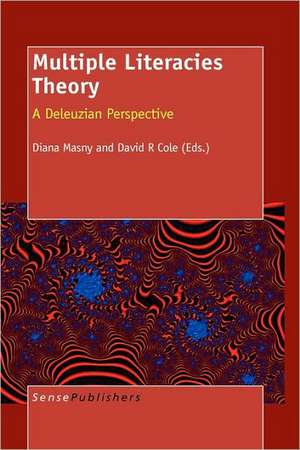Multiple Literacies Theory: A Deleuzian Perspective
Diana Masny, David R. Coleen Limba Engleză Paperback – 31 dec 2008
| Toate formatele și edițiile | Preț | Express |
|---|---|---|
| Paperback (1) | 324.52 lei 38-44 zile | |
| Brill – 31 dec 2008 | 324.52 lei 38-44 zile | |
| Hardback (1) | 567.30 lei 38-44 zile | |
| Sense Publishers – 18 iun 2009 | 567.30 lei 38-44 zile |
Preț: 324.52 lei
Nou
Puncte Express: 487
Preț estimativ în valută:
62.12€ • 67.50$ • 52.21£
62.12€ • 67.50$ • 52.21£
Carte tipărită la comandă
Livrare economică 17-23 aprilie
Preluare comenzi: 021 569.72.76
Specificații
ISBN-13: 9789087909093
ISBN-10: 9087909098
Pagini: 210
Dimensiuni: 156 x 234 x 11 mm
Greutate: 0.28 kg
Editura: Brill
Colecția Brill
Locul publicării:Netherlands
ISBN-10: 9087909098
Pagini: 210
Dimensiuni: 156 x 234 x 11 mm
Greutate: 0.28 kg
Editura: Brill
Colecția Brill
Locul publicării:Netherlands
Recenzii
"The essays in this book think through and with Deleuzian concepts in the educational field. The resultant encounters between concepts such as multiplicity, becoming, habit and affect and Multiple Literacies Theory exemplify philosophically inspired and productive thinking. "—Paul Patton, Professor of Philosophy, University of New South Wales
"Taking one of the most exciting voices of the twentieth century beyond the range of philosophy and theory this edited volume provides a timely intervention into the problem of literacy. More than the simple application of Deleuze to the question of reading this stunningly bold and incisive collection of essays will make all of us think again about what it is to read and think. Masny and Cole have assembled an impressive range of contributions that will open up new avenues for research and thinking for years to come. "—Claire Colebrook, Department of English Literature, University of Edinburgh
"Education is now so littered with ‘literacies’ that the term seems almost disposable—an empty signifier—but at the same time obsessions with literacy testing have reduced much literacies research to tiresome debates about the pros and cons of this or that approach to reading instruction. Exploring more fertile territories, Multiple Literacies Theory stages a dozen exhilarating encounters between Gilles Deleuze’s philosophical concepts and each contributing author’s approach to representing and performing multiplicity in literacies research. Although I usually avoid metaphors that insinuate violence, I see Multiple Literacies Theor y as an example of what the late Timothy Leary called a ‘transitional meaning-grenade thrown over the language barricades’—a weapon of non-destruction that produces an explosion of possibilities for destabilising conventional wisdoms (including fashionable contemporary positions coded by terms such as ‘multiliteracies’ and ‘multimodal literacies’), and clearing the ground for new materialisations of ‘becoming literate’ in conditions of complexity, multiplicity and uncertainty".—Noel Gough, Foundation Professor of Outdoor and Environmental Education, Director (Learning, Teaching & International), Faculty of Education, La Trobe University, Australia.
"Taking one of the most exciting voices of the twentieth century beyond the range of philosophy and theory this edited volume provides a timely intervention into the problem of literacy. More than the simple application of Deleuze to the question of reading this stunningly bold and incisive collection of essays will make all of us think again about what it is to read and think. Masny and Cole have assembled an impressive range of contributions that will open up new avenues for research and thinking for years to come. "—Claire Colebrook, Department of English Literature, University of Edinburgh
"Education is now so littered with ‘literacies’ that the term seems almost disposable—an empty signifier—but at the same time obsessions with literacy testing have reduced much literacies research to tiresome debates about the pros and cons of this or that approach to reading instruction. Exploring more fertile territories, Multiple Literacies Theory stages a dozen exhilarating encounters between Gilles Deleuze’s philosophical concepts and each contributing author’s approach to representing and performing multiplicity in literacies research. Although I usually avoid metaphors that insinuate violence, I see Multiple Literacies Theor y as an example of what the late Timothy Leary called a ‘transitional meaning-grenade thrown over the language barricades’—a weapon of non-destruction that produces an explosion of possibilities for destabilising conventional wisdoms (including fashionable contemporary positions coded by terms such as ‘multiliteracies’ and ‘multimodal literacies’), and clearing the ground for new materialisations of ‘becoming literate’ in conditions of complexity, multiplicity and uncertainty".—Noel Gough, Foundation Professor of Outdoor and Environmental Education, Director (Learning, Teaching & International), Faculty of Education, La Trobe University, Australia.















